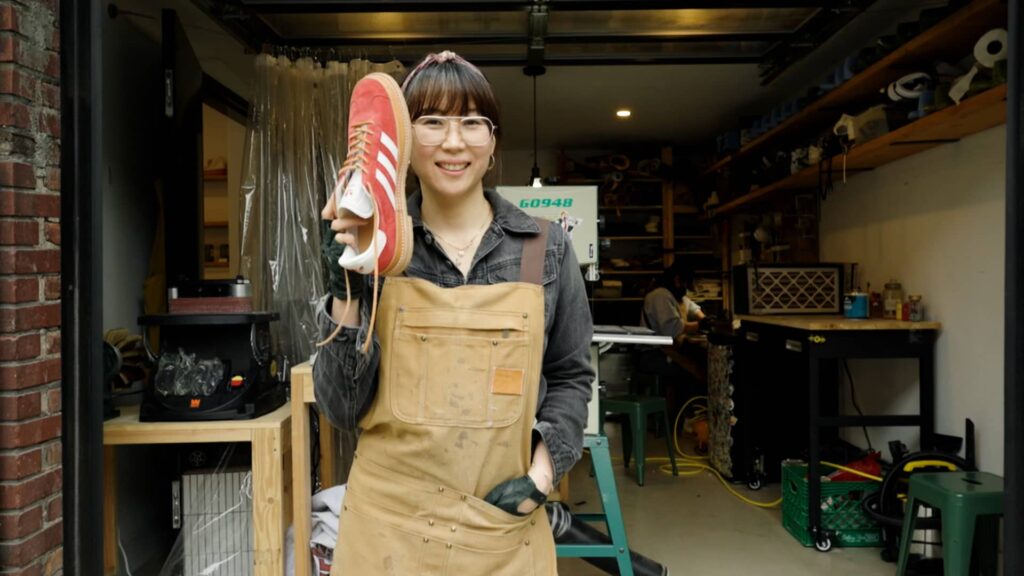When Sung Roh looks at an old pair of sneakers, she sees an opportunity to be creative, solve a problem and help someone — and she feels joy.
Roh runs a cobbling and shoe upcycling business called Cobbler Bushwick Co., which she started from her basement in the Bushwick neighborhood of Brooklyn, New York, in 2022. She now works from a combination cobbler-and-coffee shop called Cobbler Bushwick Roaster, which she co-opened in January with two business partners.
As a cobbler, Roh restores broken-down shoes to their original condition. As an upcycler, she can add creative flair to the repair job by stitching on leather patches or adding a new color of soles. “Each sneaker has its own story,” says Roh, 47. “Sometimes it’s a heel, sometimes it’s a toe [that’s worn out] … The area that you need to repair, that becomes a design element.”
The upcycling process is tedious, and can take up to 10 hours per pair of shoes, Roh says. She charges $350 to $520 for the service, and hosts $680 cobbling workshops for people curious about fixing shoes themselves.
DON’T MISS: A step-by-step guide to buying your first home—and avoiding costly mistakes
Cobbler Bushwick Co. brought in just over $37,750 in gross revenue from Jan. 1 through Tuesday, according to documents reviewed by CNBC Make It. It has already outpaced its 2024 financial performance — it brought in roughly $33,000 in gross revenue last year — in just six months.
The business was profitable in 2024, documents show, with Roh pocketing nearly $9,900 in take-home pay. (Her husband, who works for the U.S. General Services Administration, covers their household expenses, she says.)
Running a cobbling and upcycling business is physically exhausting work, says Roh, but not nearly as tiring as doing work she doesn’t enjoy. She started Cobbler Bushwick Co. after leaving her vice president job at a shoe design company in 2021, she says.
“I was burned out,” Roh says. “I [had to] keep developing similar shoes every season, and that’s like an endless cycle.”
The coffee shop and cobbler space within Cobbler Bushwick Roaster
CNBC Make It
Her brother, who works as a cobbler in South Korea, suggested that she open her own business, Roh recalls. He visited and taught her his process over the course of two weeks in 2022, and she practiced for another four months before launching her business, she says.
Now, she feels more joyful and excited to come to work, she says: “I get energy from the community … local people, rather than people I’ve never seen, [buying shoes in] an online transaction.”
Roh works with two apprentices, cobbling and upcycling shoes four days per week. She works at the coffee shop one additional day per week. The coffee portion of the new store — primarily run by her business partners, Roh’s former colleague Ahram Choi and her husband Seokhoon Choi — has already brought at least $41,000 in 2025, documents show.
Roh owns the entirety of her cobbling business, and 50% of the coffee shop, she says. The coffee business was profitable in May, she adds.
Combining two businesses into one storefront
The jump in sales for Roh’s cobbling business corresponds with the opening of Cobbler Bushwick Roaster. Customers at the coffee shop didn’t immediately bring in their old shoes while picking up their salted honey lattes, Roh notes — but she’s working to turn them into cobbling customers over time.
“It’s not immediate interest to spend,” says Roh. “They keep coming back, and they keep seeing the product, and they keep [building] the interest in cobbling. [I hope] it’s growing on them.”
To open the storefront, which costs $2,500 in monthly rent to use, the trio of business partners spent about $40,000 on renovations, she says. Roh paid another $5,000 to renovate her cobbling workshop.
For her portion of $27,500, Roh cashed out $11,900 from her Roth IRA, according to documents. She also took $3,600 out of her and her husband’s savings, put $5,000 on her credit card and borrowed the remaining $7,000 from her sister, she says.
“I’m going to just think [this is like] I’m going to get a master’s degree, [so I] need [to invest] the money,” she says. “This is an education course.”
The coffee shop element gives Roh a second stream of revenue and helps diversify her income. Even as she works to grow her shoe business, cobbling as a trade is shrinking, says Roh. In 2019, there were 5,000 shoe repair shops in the U.S. — down from 15,000 in 1997, according to the Associated Press, which cited data from The Shoe Service Institution of America, a trade organization.
“It definitely helps [having] these two businesses together … it creates a very different energy, like a very positive synergy,” says Roh, adding: “If you know how to do more than just cobbling, I think you have a better chance to survive this declining market.”
Are you ready to buy a house? Take Smarter by CNBC Make It’s new online course How to Buy Your First Home. Expert instructors will help you weigh the cost of renting vs. buying, financially prepare, and confidently navigate every step of the process—from mortgage basics to closing the deal. Sign up today and use coupon code EARLYBIRD for an introductory discount of 30% off $97 (+taxes and fees) through July 15, 2025.
Plus, sign up for CNBC Make It’s newsletter to get tips and tricks for success at work, with money and in life, and request to join our exclusive community on LinkedIn to connect with experts and peers.


